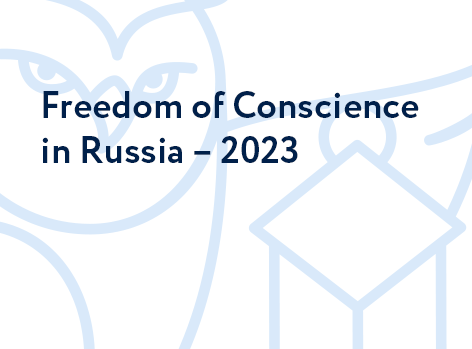SOVA Center for Information and Analysis took part in the 2015 OSCE Supplementary Human Dimension Meeting (SHDM) in Vienna (July 2-3). Here we publish the report made by the center’s speakers at working session "Freedom of Religion or Belief and fostering mutual respect and understanding in the OSCE area - opportunities and challenges" on July 2, 2015.
Dear Chairman, Dear participants of the conference!
The center "Sova" conducts monitoring of the numerous problems in Russia related to freedom of religion and conscience. The monitoring allows identifying the most urgent problems that impede the implementation of religious freedom and threaten the inter-confessional accord.
1. Not for the first year the anti-extremist legislation remains a major source of threats to freedom of conscience. Representatives of different religions are wrongfully persecuted under the provisions of this legislation, but more often than others there are various groups of Muslims and Jehovah's Witnesses who are subjected to the persecution. In 2014 new criminal cases were instituted against the followers of Said Nursi, this year one of them was sentenced to a real imprisonment. Muslim literature of the clearly non-extremist sense is still prohibited: the publications that were previously excluded from the federal list of extremist materials have been recently re-included into the list. We have repeatedly pointed out the inefficiency of the Russian anti-extremism legislation to solve the security issues. On the contrary, the employed instruments contribute to discrimination against Muslims and creating the image of enemy of them.
2. The problem of hijab remains acute in Russia which is also well-known in European countries. In some regions there were adopted regulations banning the wearing of Islamic clothing in schools. An attempt of Muslims to challenge a similar decree of the Mordovia Republic’s government in court has failed. Regulation of the religious behavior of citizens by prescriptive methods, as it seen in Russia and other countries, usually becomes an attack on freedom of conscience. But in Russia, such regulation also calls into question the supremacy of federal law in the sphere of human rights, as well as the very integrity of the legal environment, as, for example, the authorities in Chechnya, on the contrary, force women to wear headscarves. In addition, such restrictions will inevitably push a part of Muslims to radicalization.
3. The Russian law toughening administrative responsibility and introducing criminal responsibility for offending religious feelings, adopted in 2013 despite numerous protests, contrary to expectations, was not actively put into practice. However, on top of this law the authorities are finding other ways to support those appealing to religious feelings who try to affect the cultural life without considering the interests of the rest of society - both believers and non-believers. Under the pressure of radical Orthodox Christians there have been canceled concerts, performances, exhibitions and festivals in different regions of Russia, there are also evidence of censorship of works of art. The director of the Novosibirsk Opera and Ballet Theater, who refused to reconsider the repertoire policy in accordance with the wishes of the believers, was later dismissed at the decision of the Ministry of Culture. In some cases, defenders of religious feelings get their way by means of physical force, without incurring penalties.
4. The construction of churches, mosques and other houses of prayer is always a subject of a compromise between representatives of religious communities, municipal authorities and local communities. Unfortunately, in many Russian regions, primarily in Moscow, more and more frequently such a compromise cannot be reached, and the construction of temples is very often accompanied by conflicts. Orthodox community, despite the existing legislation, gets allocation of plots on the territory of park areas, which naturally raises the protests of local population, but the authorities often ignore the violations of law. At the same time, the Muslims with the evident lack of mosques in Moscow cannot get a construction permit for several years, and the officials justify their refusal by the displeasure of local residents. Such an explicit support of the interests of one religious organization to the detriment of the rest of society is perceived as discrimination and involves growth of tension in the society.
Our recommendations for OSCE participating states
1. Do not use lists of banned literature as an instrument for protecting tolerance, including religious tolerance as this tool has already demonstrated a complete lack of efficiency, and it generates a lot of human rights violations.
2. Accept the fact that religious tolerance should be protected by the same mechanisms as other forms of tolerance, and refrain from creating special rules that restrict certain freedoms for the sake of specifically religious tolerance.
3. Disavow any and all laws that interpret religious polemics as incitement to religious hatred, and to revise the previously adopted solutions reflecting this spirit.
4. Prevent enactment of new laws and other legal acts that are aimed at restriction againt public expression of religious beliefs.
5. Develop an effective mechanism for adopting decisions on the construction of religious buildings.

